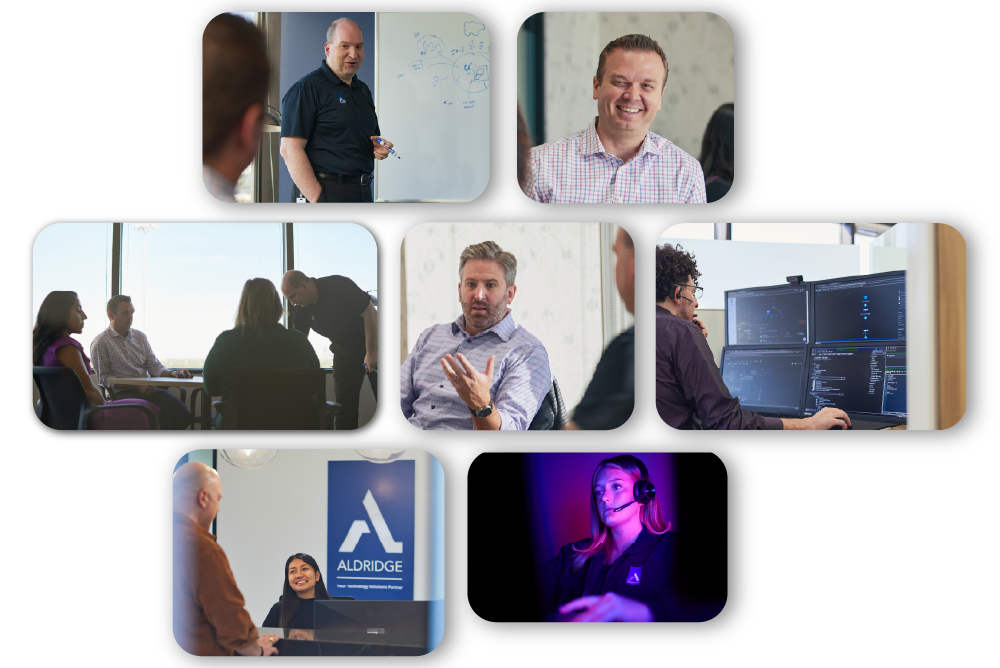Audits examine a business’s technology and provide them with an overview of their IT environment. IT audits can highlight risks within a company’s environment as well as inform an 18 to 24-month plan for future technology investment. But who should get an audit? Watch the video below to learn more about IT audits, who should get them, and how an audit can benefit your business.
Transcript
Nick LaPalomento: Hey everybody, I’m Nick and I’m joined today by Bryan Gregory. He’s the President of Aldridge. Thanks for joining us.
This is Tech Talk where we try to take complex things and make them simple and easy to understand. Today, we’re actually talking about IT audits. The first thing that I want to know is, who is an IT audit really for?
Bryan Gregory: So, an IT audit is for people in a few different categories. Usually, an executive of a company is having us do one. Whether that’s a CEO, CFO, COO of an organization. And they’re having us do it because they don’t know what’s going on in their IT environment.
They may have internal IT, and internal IT has put in a rather costly environment. Or maybe they’re asking for the funds. And they want to make sure that’s the best way to spend their money.
Or they may be outsourcing and not completely satisfied with what’s going on. They had a lot of downtime, something like that and they want someone to come in and say, “What’s going on in my environment?” “Do I have the right infrastructure in place,” or “Is my support actually what’s lacking?”
And one of the other things we see when people have an internal team is that team is solely focused on what their network is and they don’t get a lot of time to look at what other options are out there. They do things the same way that they’ve always done them because that’s the way that they’ve always done them. Instead of looking at, “What are other applications out there,” or “What could we do to do this a little differently and make the staff more efficient than they have been in the past?”
Nick: So, our experience and our knowledge working with lots of different clients in different industries, and working across a whole gamut of technology really helps give us kind of an edge in that.
Bryan: Yeah, yeah. I mean, we work with a lot of manufacturing firms, for example. So, we can look at, “Hey, we’ve got this manufacturing company that did this and it increased productivity.” We can then turn around and take that to other manufacturers to do the same thing.
Nick: What do you actually get from an IT audit?
Bryan: We first go in and send a technical resource to take a look at what you’ve got. So, we have a lot of tools and scans that we run to look at what it is. And that’s going to send back a lot of information; it’s also going to point out a lot of vulnerabilities and aging equipment that’s out there.
In Houston we have hurricanes, in Dallas we have tornadoes, so making sure that we get an understanding of if there is that disaster what’s the recovery plan look like? And better yet, what’s that continuity plan look like? If you’re in Houston and there’s a hurricane, and all of your customers are in Houston, then maybe it’s OK that you’re down for a few days. But if you do business internationally, you’ve got to make sure that you have a continuity plan in place that when that hurricane does hit that you can keep doing business as usual.
The second thing we do is go in and interview their executive team. What do they want to get out of technology? And it’s not really a technical discussion. It’s a, “What’s your business doing? What’s your business goals?” So then we can take those two things and marry them together to make sure that the solutions line up.
And the other thing that we line it up with is an employee survey that we send out. So, we send out a survey that’s branded by the company. They don’t see our name on it. It looks like it’s coming from the executives of the organization just wanting to know how IT’s going? What tools do you wish you had that you didn’t have? What’s working? What’s not working?
And then, our CIO takes a look at all three of those things, puts them together to put together a 12 to 18-month roadmap. And that roadmap can be done and completed by someone like us or they can take that roadmap and hand it to their existing IT staff and say, “Here’s the direction we would like to go in.” Or hand it to their existing IT provider to execute on as well.
Nick: So, what would you say to somebody who asks why they should get an IT audit? Why does their business need one?
Bryan: If they know they’re prepping for growth, that’s a big reason to get one because what a 40 person company has in place isn’t going to be the same thing that a 100 person company needs to have in place.
So, making sure that we’ve got that roadmap, like I said, in place to say, “Here’s what we’re going to do over the next 12 to 18 months to accommodate that growth.” That’s a big catalyst for having an audit. Or someone that’s had, maybe, a recent data breach or had data loss because they had some scenario where equipment went down or data got deleted and they weren’t able to put it back.
Nick: What do you say to somebody if they say they can’t afford it?
Bryan: I’m biased, so I would say you can’t afford to not have one. The audit really puts the business executive that’s having it done in the driver’s seat.
It gets them informed of what the risks are, what it’s going to take to fix those risks and what the investments could be in the future, and what those choices will do for them.
Nick: I definitely think that was informative. Thank you so much for joining us today. And thank you guys for watching. We’ll see you on the next Tech Talk.






